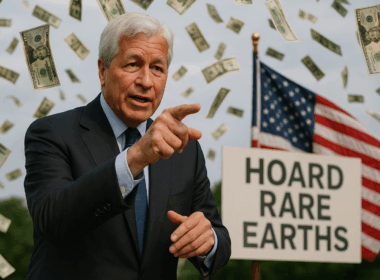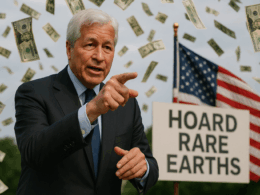For months, we have been waiting on Bernanke to make his speech at Jackson Hole. For months, the market has been on tilt with some of the wildest trading days we have ever seen. For months, gold has been making new highs.
For months, it has been the same old story.
There’s no doubt in my mind that everywhere you turned Friday, Bernanke was the focus. So I am not going to bore you. In short, Bernanke said everything we already know in his opening paragraph:
“The financial crisis and the subsequent slow recovery have caused some to question whether the United States, notwithstanding its long-term record of vigorous economic growth, might not now be facing a prolonged period of stagnation, regardless of its public policy choices. Might not the very slow pace of economic expansion of the past few years, not only in the United States but also in a number of other advanced economies, morph into something far more long-lasting? ”
His speech spoke volumes without saying anything: QE3 is needed.
In past letters, I have maintained my stance that QE3 is inevitable (see Time to Feel the Pain). In a note published earlier this week, Goldman Sachs said that $1 trillion in QE3 is an absolute minimum if the Fed wants to get GDP higher by at least 0.5%:
“Taken together, our analysis suggests that QE3 is unlikely to be a panacea for growth. Nonetheless, our estimates suggests that $1trillion of asset purchases-or an equivalent increase in the duration of the Fed’s balance sheet-might increase GDP growth by up to 0.5 percentage point in the first year after any announcement of QE3.”
I know QE3 will do more harm than good in the long term. I know it may not be as effective as QE1 or QE2. I know the effects of QE3 on financial conditions may be at least partially offset by the Treasury’s debt management policies. But for now, both the market and overall consumer confidence, need to be addressed for the short term.
Bernanke knows it. That is why he announced that a second day has been added to the next Federal Open Market Committee meeting in September to “allow a fuller discussion” of the economy and the Fed’s possible response. Something will happen on those days. But again, we just don’t know what.
Over my recent letters, I talked about focusing on what we do know, rather than what we don’t. So I gathered up some facts that’ll give you a broader picture of what’s happening in the U.S. — word of caution, it ain’t pretty:
- Nearly one out of every five American men between the ages of 25 and 54 does not have a job at the moment
- Approximately one million homes were repossessed by financial institutions in 2010 and a similar number of repossessions is expected in 2011.
- The combination of federal government spending, state government spending and local government spending now accounts for a larger share of U.S. GDP than at any other time in our history
- The supply of existing homes for sale continues to go up
- The value of U.S. homes has fallen by a total of approximately 6.6 trillion dollars since the peak of the housing market
The more money you make, the less taxes you pay: General Electric, the nation’s largest corporation, reported worldwide profits of $14.2 billion, and said $5.1 billion of the total came from its operations in the United States. Its American tax bill? None. In fact, G.E. claimed a tax benefit of $3.2 billion. Meanwhile, citizens are being forced to pay taxes with money they don’t have.
Ten years ago, the United States was ranked number one in average wealth per adult. In 2010, the United States fell to seventh
In 2010, the United States had the worst current account balance in the world. The U.S. had a current account balance of negative 561 billion dollars for 2010 (see The Shocking Truth)
It takes the average unemployed worker about 40 weeks to find a new job.
Today, one out of every four American children is on food stamps: It is being projected that approximately 50 percent of all U.S. children will be on food stamps at some point in their lives before they reach the age of 18
To date, American household wealth has lost $7.7 trillion since the recession: U.S. household wealth fell by about $16.4 trillion of net worth from its peak in spring 2007, about six months before the start of the recession, to when things hit bottom in the first quarter of 2009, according to figures from the Federal Reserve.
While a rebound in the stock market, an improved savings rate and consumer steps to reduce debt resulted in net worth gains since 2009, only a little more than half of that lost wealth – $8.7 trillion — is back on household balance sheets.
That leaves American household wealth $7.7 trillion less than it was before the recession.
Those are just some of the little details that the US is afraid to tell you. But there’s more. There’s always more…
America Up for Sale
Pieces of America are literally being auctioned off just to help state and local governments minimize their debt problems.
Earlier last month, a bill that will allow the state government of Ohio to proceed with plans to lease the Ohio Turnpike to investors was approved.
Highways have also been auctioned off (most of the time to foreign investors): A toll highway in Indiana (sold to a Spanish and Australian joint venture), the Chicago skyway, and stretches of highway in Florida, Virginia and Texas.
In Chicago, it’s the sale of parking meters to the sovereign wealth fund of Abu Dhabi. Parking meters in Nashville, Pittsburgh, Los Angeles, and other cities are also being sold.
In Wisconsin it’s public health and food programs. In California it’s libraries, water treatment plants, schools, toll roads, airports, and power plants. It’s Amtrak.
Oh, and guess what?
It’s the bankers that caused our financial mess in the first place that are selling these pieces of assets from taxpayers, to private investors.
In Goldman Sach’s 2010 SEC filing, Goldman says it will be involved with “ownership and operation of public services, such as airports, toll roads and shipping ports, as well as power generation facilities, physical commodities and other commodities infrastructure components, both within and outside the United States.”
I am not done.
America Selling Out
All this talk about infrastructure and job creation by the government is just that…talk.
Much of U.S’ infrastructure is not even built in the country anymore.
For example, a 2,050ft-long bridge spanning the San Francisco bay is actually being built in China by the China State Construction Engineering Group and is being shipped over to the U.S. piece by piece.
According to an article in the Telegraph:
According to Engineering News Record, five of the world’s top 10 contractors, in terms of revenue, are now Chinese, with likes of China State Construction Engineering Group (CSCEC) overtaking established American giants like Bechtel.
CSCEC has already built seven schools in the US, apartment blocks in Washington DC and New York and is in the middle of building a 4,000-room casino in Atlantic City. In New York, it has won contracts to renovate the subway system, build a new metro platform near Yankee stadium, and refurbish the Alexander Hamilton Bridge over the Harlem river.
Massive corporations that are either fully or partially owned by the Chinese government are deeply integrating themselves into the U.S. economy.
So what happened to infrastructure as part of Obama’s promise of new job creation? I’ll let you figure that one out for yourself.
While the long term outlook for the US doesn’t look pretty, it doesn’t mean everything is going to collapse right now. The fact is, the US is still the world power – even with the economic turmoil brewing. Let’s not forget that all of these negative statements are a reflection of what the US once was.
If you think the US is no longer a player, you’d be nuts. Even without growth, the US is still number one. While this may not last, there is still a window of opportunity for profits in the US markets. So buck up and stop worrying because the time for worry will come later.
Summer is almost over, which means play time is over. The markets will be back in full swing over the next few weeks and I have a strong feeling that we’re going to see a rally soon enough.
Enjoy the last days of sun because its back to work and back to aggressively making money. The time period to do so will be short lived, so be ready to make moves.
Until next week,
Ivan Lo
Equedia Weekly

Forward-Looking Statements
This Newsletter and report contains certain forward-looking statements that may involve a number of risks and uncertainties. Actual events or results could differ materially from current expectations and projections. Except for statements of historical fact relating to the project, certain information contained herein constitutes “forward-looking statements”. Forward-looking statements are frequently characterized by words such as “plan”, “expect”, “project”, “intend”, “believe”, “anticipate” and other similar words, or statements that certain events or conditions “may” or “will” occur.
Except for the statements of historical fact, the information contained herein is of a forward-looking nature. Such forward-looking information involves known and unknown risks, uncertainties and other factors which may cause the actual results, performance or achievement of the Company to be materially different from any future results, performance or achievements expressed or implied by statements containing forward-looking information.
Although the Company has attempted to identify important factors that could cause actual results to differ materially, there may be other factors that cause results not to be as anticipated, estimated or intended. There can be no assurance that statements containing forward looking information will prove to be accurate as actual results and future events could differ materially from those anticipated in such statements. Accordingly, readers should not place undue reliance on statements containing forward looking information. Readers should review the risk factors set out in the Company’s prospectus and the documents incorporated by reference.
Cautionary Note to U.S. Investors Concerning Estimates of Inferred Resources
This presentation uses the term “Inferred Resources”. U.S. investors are advised that while this term is recognized and required by Canadian regulations, the Securities and Exchange Commission does not recognize it. “Inferred Resources” have a great amount of uncertainty as to their existence, and great uncertainty as to their economic and legal feasibility. It cannot be assumed that all or any part of an Inferred Resource will ever be upgraded to a higher category. Under Canadian rules, estimates of “Inferred Resources” may not form the basis of feasibility or other economic studies. U.S. investors are also cautioned not to assume that all or any part of an “Inferred Mineral Resource” exists, or is economically or legally mineable.
Disclaimer and Disclosure
Disclaimer and Disclosure Equedia.com & Equedia Network Corporation bears no liability for losses and/or damages arising from the use of this newsletter or any third party content provided herein. Equedia.com is an online financial newsletter owned by Equedia Network Corporation. We are focused on researching small-cap and large-cap public companies. Our past performance does not guarantee future results. Information in this report has been obtained from sources considered to be reliable, but we do not guarantee that it is accurate or complete. This material is not an offer to sell or a solicitation of an offer to buy any securities or commodities.
Furthermore, to keep our reports and newsletters FREE, from time to time we may publish paid advertisements from third parties and sponsored companies. We are also compensated to perform research on specific companies and often act as consultants to many of the companies mentioned in this letter and on our website at equedia.com. We also make direct investments into many of these companies and own shares and/or options in them. Therefore, information should not be construed as unbiased. Each contract varies in duration, services performed and compensation received.
Equedia.com is not responsible for any claims made by any of the mentioned companies or third party content providers. You should independently investigate and fully understand all risks before investing. We are not a registered broker-dealer or financial advisor. Before investing in any securities, you should consult with your financial advisor and a registered broker-dealer. The information and data in this report were obtained from sources considered reliable. Their accuracy or completeness is not guaranteed and the giving of the same is not to be deemed as an offer or solicitation on our part with respect to the sale or purchase of any securities or commodities. Any decision to purchase or sell as a result of the opinions expressed in this report OR ON Equedia.com will be the full responsibility of the person authorizing such transaction.
Again, this process allows us to continue publishing high-quality investment ideas at no cost to you whatsoever. If you ever have any questions or concerns about our business or publications, we encourage you to contact us at the email or phone number below.
Please view our privacy policy and disclaimer to view our full disclosure at http://equedia.com/cms.php/terms. Our views and opinions regarding the companies within Equedia.com are our own views and are based on information that we have received, which we assumed to be reliable. We do not guarantee that any of the companies will perform as we expect, and any comparisons we have made to other companies may not be valid or come into effect. Equedia.com is paid editorial fees for its writing and the dissemination of material and the companies featured do not have to meet any specific financial criteria. The companies represented by Equedia.com are typically development-stage companies that pose a much higher risk to investors. When investing in speculative stocks of this nature, it is possible to lose your entire investment over time. Statements included in this newsletter may contain forward looking statements, including the Company’s intentions, forecasts, plans or other matters that haven’t yet occurred. Such statements involve a number of risks and uncertainties. Further information on potential factors that may affect, delay or prevent such forward looking statements from coming to fruition can be found in their specific Financial reports.
Equedia Network Corporation is also a distributor (and not a publisher) of content supplied by third parties and Subscribers. Accordingly, Equedia Network Corporation has no more editorial control over such content than does a public library, bookstore, or newsstand. Any opinions, advice, statements, services, offers, or other information or content expressed or made available by third parties, including information providers, Subscribers or any other user of the Equedia Network Corporation Network of Sites, are those of the respective author(s) or distributor(s) and not of Equedia Network Corporation. Neither Equedia Network Corporation nor any third-party provider of information guarantees the accuracy, completeness, or usefulness of any content, nor its merchantability or fitness for any particular purpose.












